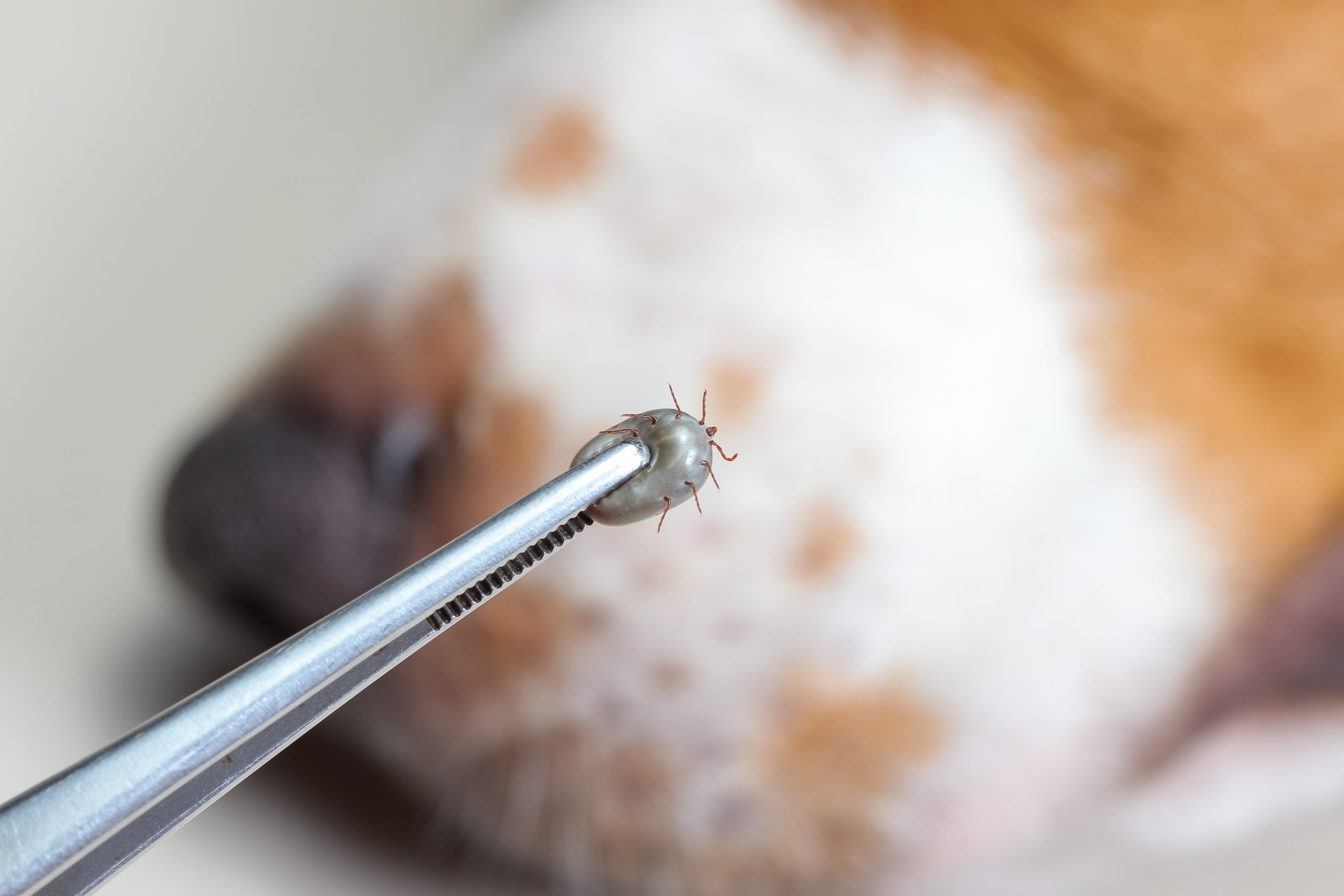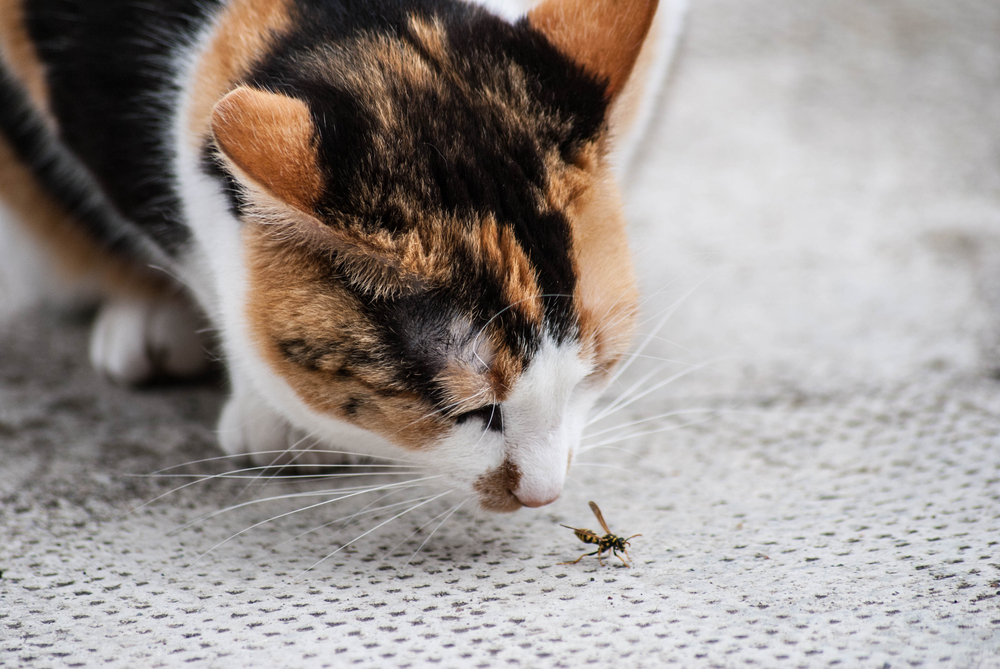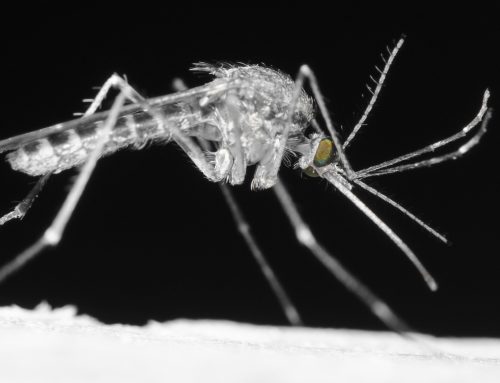Have you ever watched in horror as your cat or dog chomps wildly at the air, trying to catch a wasp that has a huge stinger? Most often, a winged menace can make a clean getaway, but sometimes your pet’s persistent pursuit ends with your furry pal getting stung. However, bees and wasps aren’t the only insects that can harm your pet. While many bites and stings are not serious and will heal on their own, some can cause pain, itching, and a dangerous allergic reaction that leads to your pet experiencing respiratory distress. Summer months mean more outdoor time for your pet, increasing their bug bite and sting risk. Our Town & Country Animal Hospital team shares everything you need to know about bug bites and stings in pets.
Flea bites in pets
These tiny insects thrive in warm, humid environments and feed on mammals’ and birds’ blood. Fleas are excellent jumpers and can easily leap from one host to another. When a flea feeds on your pet, they inject a small amount of saliva. Some pets are allergic to a protein in flea saliva and develop flea allergy dermatitis (FAD). One flea bite is enough to cause an affected pet to have an extremely itchy reaction. The best way to protect your pet from these bloodthirsty parasites is to keep your furry pal on a year-round flea preventive product. Keep an eye out for your pet’s flea bite signs and learn about their treatment options:
- Signs — The most obvious flea bite signs are itchiness and scratching. Your pet may seem unusually irritated and may continuously scratch, bite, or lick certain areas such as their lower back, tail, neck, thighs, or belly. Another flea infestation sign is flea dirt, which appears as tiny black specks on your pet’s skin or in their hair. However, these specks are flea feces, composed of digested blood.
- Treatment — You must eliminate all fleas from your pet and their environment. Our Town & Country Animal Hospital team can recommend suitable flea eradication and preventive products. Keep in mind that an important strategy in preventing a flea infestation is to launder your pet’s bedding regularly in hot water and to vacuum your home thoroughly.
Ticks bites and pets

Ticks can attach to your pet’s skin, feed on your four-legged friend’s blood, and transmit serious diseases. Ticks are a year-round threat and often inhabit heavily wooded areas and tall grasses. All pets who go outdoors need an effective year-round tick preventive. Always check your pet for ticks after they have been outdoors, keep an eye out for tick bite signs, and learn about your furry pal’s treatment options.
- Signs — If you think your pet has a tick, take a close look before you get the tweezers. Avoid mistaking a skin growth or wart for an attached tick. A tick will have one attachment point at the head and depending on their life stage, six to eight visible legs. An engorged tick will be swollen and might be a grey color, while a recently attached tick will be relatively flat and a brown color.
- Treatment — The best way to prevent disease transmission and potential future complications is to remove a tick from your pet’s skin as soon as you find one. Using blunt-edged tweezers, grasp the tick at their head’s base, as close as possible to your pet’s skin. Pull the tick straight out using smooth, even pressure until you feel it release. Seal the tick in a plastic bag. Let our Town & Country Animal Hospital team know that your pet may have been exposed to a tick-borne disease, so we can monitor them closely for illness during the upcoming weeks.
Mosquito bites in pets
Mosquitoes feed on blood, and if a mosquito bites your pet, your four-legged friend may contract heartworm disease, a potentially fatal condition if left untreated. When an infected mosquito bites your pet, the pest transfers heartworm larvae into your furry pal’s bloodstream. Over the next several months, the larvae migrate to your pet’s lungs and heart, where they develop into adult worms damaging these organs. To prevent your pet from contracting heartworm disease, you must administer year-round heartworm prevention. Keep an eye out for your pet’s heartworm signs and learn about their treatment options.
- Signs — Heartworm disease signs vary depending on the infection’s severity. During the disease’s early stages, your pet may not show any signs. However, as the heartworm larvae mature and the infection progresses, signs may include:
- Coughing
- Lethargy
- Decreased appetite
- Weight loss
- Difficulty breathing
- Abdominal swelling
- Treatment — Our Town & Country Animal Hospital team can perform a simple blood test to determine whether your pet has heartworm disease. However, heartworm disease treatment can be expensive and challenging, and the sooner we diagnose a pet and begin treatment, the better their prognosis. Heartworm treatment is available only for dogs and involves a series of injections to kill the adult heartworms. During and after the treatment, which can take months, you must restrict your pet’s activity and carefully monitor them to prevent further heart and lung damage. No heartworm treatment is available for cats.
Bee, wasp, and hornet stings in pets
These insects can sting pets and cause pain, swelling, and itching. Some pets may also have an allergic reaction to a sting, which can lead to more serious complications. Keep an eye out for your pet’s allergic reaction signs and learn about their treatment options:
- Signs — If your pet suddenly paws their face or chews their foot, or if any of their body area begins to swell, they have likely been stung. Allergic reactions usually occur within 20 minutes of a sting. However, the reaction can be delayed for hours, so monitor your pet and call our veterinary team immediately if your four-legged friend shows any of these signs:
- Severe swelling
- Hives
- Difficulty breathing
- Wheezing
- Excessive drooling
- Vomiting
- Diarrhea
- Disorientation
- Seizure
- Treatment — If your pet has been stung, remove the stinger, which can secrete venom if it is still embedded in their skin. To soothe the sting site, apply a paste of baking soda and water, and then apply an ice pack to reduce swelling. Monitor your pet closely and seek immediate veterinary care if they exhibit allergic reaction signs.
Contact our Town & Country Animal Hospital team, so we can recommend the most effective parasite preventive product for your pet or answer your additional bug bite questions.







Leave A Comment